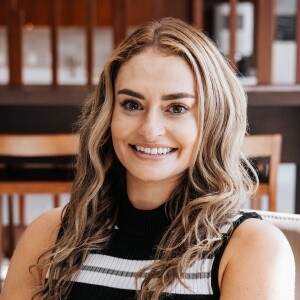Episodes

Monday Jan 13, 2025
Monday Jan 13, 2025
In this episode of Zebra Talks, host Dr. Libby Hinsley welcomes Dr. Melissa Koehl to discuss her journey with Hypermobile Ehlers-Danlos Syndrome (EDS) and how it has shaped her career in physical therapy.
Melissa shares her personal struggles with diagnosis, the importance of recognizing hypermobility in the context of fibromyalgia, and the intersection of these conditions with other systemic issues like dysautonomia and mast cell activation syndrome. She also discusses the significance of personalized exercise programs, gut health, and the holistic approaches necessary to manage these complex conditions effectively.
00:00 Introduction to Zebra Talks
00:35 Meet Melissa Kahle: A Journey with Hypermobile EDS
01:40 Melissa's Personal and Professional Journey
03:35 The Diagnosis and Its Impact
06:19 Exploring Fibromyalgia and Hypermobility
06:48 Understanding Fibromyalgia: Diagnosis and Criteria
12:04 Treatment Approaches for Fibromyalgia
16:13 Exercise and Movement Strategies
22:35 Exploring Mast Cells and Fibromyalgia
24:28 The Gut Microbiome and Pain Connection
24:53 Personal Struggles with SIBO
29:20 Navigating Healthcare as a Hypermobile Human
31:59 Creating Resources for the Hypermobile Community
37:33 Final Thoughts and Resources

Monday Jan 06, 2025
Monday Jan 06, 2025
In this episode of Zebra Talks, host Dr. Libby Hinsley welcomes Dr. Jessica Eccles, a prominent consultant psychiatrist and researcher, to discuss her personal and professional experiences with hypermobility syndromes. Dr. Eccles shares insights from her extensive research on the links between hypermobility, anxiety, neurodevelopmental conditions, and chronic health issues such as fibromyalgia and ME/CFS. She explains how differences in brain structure and function, along with abnormal autonomic nervous system responses, can affect those with hypermobility. Dr. Eccles also introduces a novel treatment approach, the ADAPT therapy, designed to reduce anxiety in hypermobile individuals. The conversation highlights the importance of proper diagnosis, medical education, and innovative therapeutic strategies for managing these complex conditions.
00:00 Introduction to Zebra Talks
00:35 Meet Dr. Jessica Echols
01:34 Dr. Echols' Personal Journey with Hypermobility
04:00 Discovering the Link Between Hypermobility and Anxiety
08:50 Exploring Brain Differences in Hypermobile Individuals
11:00 The Role of the Involuntary Nervous System
17:02 Novel Treatments and Future Research
21:05 Connections Between Hypermobility and Neurodivergence
35:45 Challenges and Future Directions in Medical Education
39:53 Conclusion and Final Thoughts

Monday Jul 01, 2024
Monday Jul 01, 2024
If you have a bendy neck, this one's for you!
For this week's episode of Zebra Talks, Libby has a fascinating conversation with Taylor Goldberg, a chiropractor turned virtual hypermobility coach. Taylor shares a bit about her personal journey with hypermobility and her shift to a virtual coaching model, and then helps us understand all things upper cervical instability (UCI), including its causes, symptoms, diagnostic challenges, and treatment options. UCI affects a whole lot of people with hypermobility, but good news: the most severe cases requiring surgery are quite rare even among us bendy types. Whew!
Taylor unpacks a lot of definitions such as distinguishing between hypermobility and instability (no, they're not the same thing!). She also covers lots of good info about safe exercise practices, and emphasizes why it's so important to avoid certain chiropractic adjustments. The episode also touches on yoga practices for hypermobile individuals and the significance of conservative care in managing UCI.Highlights of this episode include:00:00 Introduction to Zebra Talks00:35 Meet Taylor Goldberg: Chiropractor to Hypermobility Coach01:49 Taylor's Personal Journey with Hypermobility03:40 Understanding Hypermobility and Instability06:11 Upper Cervical Instability: Symptoms and Diagnosis14:42 Managing Upper Cervical Instability19:01 Activities to Avoid and Chiropractic Cautions24:12 Challenges in Chiropractic and PT Training25:23 The Need for Comprehensive Connective Tissue Education27:02 Creating Realistic Expectations in Recovery27:49 Step-by-Step Recovery Process29:39 Exercise Categories and Proprioception33:46 Managing Upper Cervical Instability35:01 Yoga and Hypermobility39:11 Resources and Offerings for Hypermobility41:16 Conclusion and Final Thoughts

Monday Jun 24, 2024
Monday Jun 24, 2024
In this episode of Zebra Talks, Dr. Libby Hinsley welcomes Lisa Sherman, a licensed acupuncturist with expertise in functional medicine and molecular biology, to discuss digestive issues among people with hypermobility syndromes.
They delve into the prevalence of gastrointestinal problems like dysmotility, microbial dysbiosis, and structural droopiness that hypermobile individuals often face. Lisa offers insights on contributing factors such as the autonomic nervous system and mast cell activation, and shares practical advice for lifestyle changes, nutritional strategies, and supplements that can help manage these conditions. The episode highlights the importance of mindful eating, movement practices, and vagus nerve activation for improving gut health in hypermobile individuals.
Highlights of this episode include:
00:35 Meet Lisa Sherman: Expert on Bendy Bellies01:39 Understanding Digestive Issues in Hypermobile People02:56 Prevalence and Impact of GI Issues04:00 Common GI Conditions in the Bendy Population07:03 Functional Gastrointestinal Disorders (FGIDS)08:54 The Role of the Nervous System in Digestion11:14 Hypermobile Gut and Hypomotility18:19 Testing and Treating Gut Motility Issues28:54 The Bendy, Itchy, and Dizzy Trifecta37:57 Understanding Functional Gastrointestinal Disorders39:24 Practical Tips for Gut Health43:44 The Importance of Protein and Collagen49:15 Navigating Histamine and FODMAPs56:47 Supplements and Prokinetics01:04:15 Vagus Nerve Stimulation and Lifestyle Changes01:08:53 Research and Future Directions01:10:25 Conclusion and Contact Information

Monday Jun 10, 2024
Monday Jun 10, 2024
In this episode of Zebra Talks, Libby welcomes biomechanics expert Jules Mitchell to discuss the science of stretching and connective tissue behavior, particularly in the context of hypermobility syndromes.
Jules provides insights from her extensive research and professional experience, addressing common misconceptions about stretching, the adaptive capabilities of connective tissue, and how people with hypermobility can safely engage in physical activities. The discussion includes the impact of mechanical tension on tissue adaptation, the importance of understanding individual responses to stretching, and the role of exercise science in improving joint stability and resilience.
Jules, who is also the author of 'Yoga Biomechanics Stretching Redefined' and an educator of yoga teachers worldwide, shares valuable perspectives on the interplay between biomechanics and yoga practices, offering practical advice for both practitioners and instructors.
00:35 Meet Jules Mitchell: Yoga Biomechanics Expert02:18 Jules' Journey into Stretching Research04:55 Understanding Connective Tissue and Hypermobility12:46 The Science of Stretching and Tissue Adaptation18:37 Practical Advice for Bendy People40:22 Final Thoughts and Resources

Monday Jun 03, 2024
Monday Jun 03, 2024
In this Zebra Talks episode, host Dr. Libby Hinsley interviews Alanna Trzcinski, host of the Endo Battery Podcast and president of EndoVillage. The episode delves into Alanna's journey with endometriosis, advocacy work, and the surprising intersections with hypermobility syndromes. Alanna sheds light on the challenges of living with both conditions, the importance of excision surgery for endometriosis, and the nuanced nature of these overlapping chronic illnesses. The two discuss the critical role of multidisciplinary care, the need for increased research, and the psychological aspects of managing chronic pain. Listeners will gain valuable insights into the complexity of these conditions and the importance of informed, holistic care.
Highlights of this episode include:
00:35 Meet Alanna Trzcinski: Advocate for Endometriosis Awareness02:24 Alana's Personal Journey with Endometriosis05:21 Understanding Endometriosis: Definitions and Misconceptions07:25 The Overlap Between Endometriosis and Hypermobility Syndromes11:33 Challenges in Diagnosing and Treating Endometriosis15:18 Effective Management and Treatment Options18:54 The Importance of Multidisciplinary Care24:54 Surgical Treatments: Excision vs. Ablation31:20 Living with Endometriosis and Hypermobility34:08 Advocacy and Future Research40:39 Final Thoughts and Resources

Monday May 27, 2024
Monday May 27, 2024
This episode of Zebra Talks features a discussion with Naomi Bauer, a Doctor of Physical Therapy with personal and professional experience in treating dysautonomia and Long COVID. Hosted by Dr. Libby Hinsley, they explore the challenges and management strategies for those living with hypermobility syndromes, focusing on the overlap between long COVID, dysautonomia, and hypermobility.
Naomi shares her journey from a healthcare professional to a patient after developing long COVID dysautonomia herself and highlights the importance of understanding personal energy management through pacing and the 50 percent rule. The conversation also addresses potential underlying connections between hypermobility and the increased risk of developing long COVID, emphasizing the significance of social support, proactive resting, and setting boundaries for energy use.
Highlights of this episode include:
00:32 Meet Naomi Bauer: A Journey from PT to Long COVID Survivor01:42 Exploring the Intersection of Long COVID and Hypermobility Syndromes01:56 Naomi's Personal Battle with Long COVID and Suspected Hypermobility05:55 The Complex World of Dysautonomia: From POTS to Long COVID14:28 The Link Between Hypermobility Syndromes and Long COVID23:47 Managing Long COVID and Hypermobility: Strategies for Recovery41:24 Concluding Thoughts and Finding Support

Monday May 20, 2024
Monday May 20, 2024
In this episode of the Zebra Talks podcast, host Libby Hinsley interviews Megan Beach Gomes, a specialized pelvic health physical therapist focusing on pelvic pain and perinatal care. She discusses her journey into specializing in pelvic health and the importance of physical therapy for pregnant and postpartum individuals, especially those dealing with hypermobility.
Gomes highlights the key role of the hormone relaxin during pregnancy and its effects on the body's mobility, the challenges hypermobile individuals may face during and after pregnancy, and provides practical advice and exercises to help manage symptoms. Gomes emphasizes the need for comprehensive care, including pelvic support belts, specific exercises, and how to deal with issues such as diastasis recti postpartum. She also touches on finding specialized help through resources like the EDS Society, the importance of patient advocacy, and options like telehealth for individuals with limited access to specialized care.
Highlights of this episode include:
- Welcome to Zebra Talks: Introducing Megan Beach Gomes- Journey into Pelvic Health: Megan's Story- Understanding Hypermobility in Pregnancy- Managing Pregnancy Symptoms for the Hypermobile- Navigating Labor and Delivery with Hypermobility- Preparation and Advocacy for Hypermobile Pregnant Persons- Pregnancy Wellness Tips for the Hypermobile- Ergonomic Supports for Comfortable Sitting- Exercise Tips for Pregnancy with Increased Laxity- Hip Hinge: The Ultimate Exercise for Pregnancy- Managing Pelvic Girdle Pain with Simple Adjustments- Postpartum Considerations for the Bendy Population- Navigating Postpartum Recovery: Scar Care and Core Support- Addressing Diastasis Recti in Postpartum Recovery- Preventing and Managing Mommy Thumb Postpartum- Finding Specialized Perinatal Physical Therapy

Monday May 13, 2024
Monday May 13, 2024
In this episode of Zebra Talks, host Dr. Libby Hinsley discusses the intersection of hypermobility syndromes and gender affirming care with Dr. Laura Ross, a pelvic health physical therapist and sex counselor. Dr. Ross, based in Decatur, Georgia, shares her journey and passion for providing inclusive care for all genders, focusing on pelvic pain, sexual health, pelvic health in athletes, and care specific to transgender and gender expansive individuals. She emphasizes the importance of creating a safe space for LGBTQ+ patients, especially those dealing with hypermobility.
Their conversation explores the high prevalence of hypermobility among individuals seeking gender affirming surgeries, citing research that highlights a significant connection between hypermobility and gender diversity. The conversation also covers the importance of comprehensive care that includes prehabilitation, rehabilitation, and the consideration of sensory processing issues.
Dr. Ross stresses the necessity for healthcare providers to develop competencies in treating gender diverse individuals, suggesting resources for both patients and practitioners. The episode aims to raise awareness about the need for accessible and affirming healthcare for hypermobile and gender diverse communities.
Highlights of this episode include:
00:38 Introducing Dr. Laura Ross: A Journey into Pelvic Health and Gender Affirming Care02:24 Exploring the Intersection of Hypermobility and Gender Affirming Care04:39 Demystifying Gender Affirming Care: Terminology and Importance10:35 The Link Between Hypermobility and Gender Diversity: Emerging Research22:17 Gender Affirming Surgeries and Hypermobility: Pre and Postoperative Considerations39:19 Empowering Healthcare: Inclusivity and Competency in Gender Diverse Care45:46 Connecting with Dr. Laura Ross and Final Thoughts

Monday May 06, 2024
Monday May 06, 2024
In this episode of Zebra Talks, host Dr. Libby Hinsley delves into the complexities of pelvic health in individuals with hypermobility syndromes with special guest Beth Kemper. Beth is a seasoned physical therapist with dual certification in Women's Health and Pelvic Health. She discusses the prevalence of hypermobility among her pelvic PT patients and the unique challenges they face.
The conversation covers a range of pelvic-related issues, including elimination dysfunctions, pelvic organ prolapse, gynecological concerns, and pelvic pain, offering insights into their treatment. Beth emphasizes the importance of a comprehensive approach that includes manual therapy and retraining of the pelvic floor and related muscle groups, alongside utilizing support devices where necessary.
Additionally, the podcast touches on the importance of proper diagnosis and the potential impact of surgeries. Listeners are encouraged to seek skilled pelvic PTs, and the episode underscores the importance of hope and proactive care in managing pelvic health for the hypermobile population.
Highlights of this episode include:
00:36 Meet Beth Kemper: A Deep Dive into Pelvic PT and Hypermobility01:23 Exploring the Prevalence and Impact of Hypermobility in Pelvic PT04:09 Unpacking Common Pelvic Issues in the Bendy Population11:58 Addressing Incontinence and Elimination Challenges13:01 Comprehensive Treatment Approaches for Pelvic Conditions18:58 The Importance of Tailored Rehabilitation for Hypermobility20:04 Exploring Supportive Devices and Surgical Considerations32:40 Finding the Right Pelvic PT: Tips and Advice37:11 Final Thoughts and Upcoming Episodes







